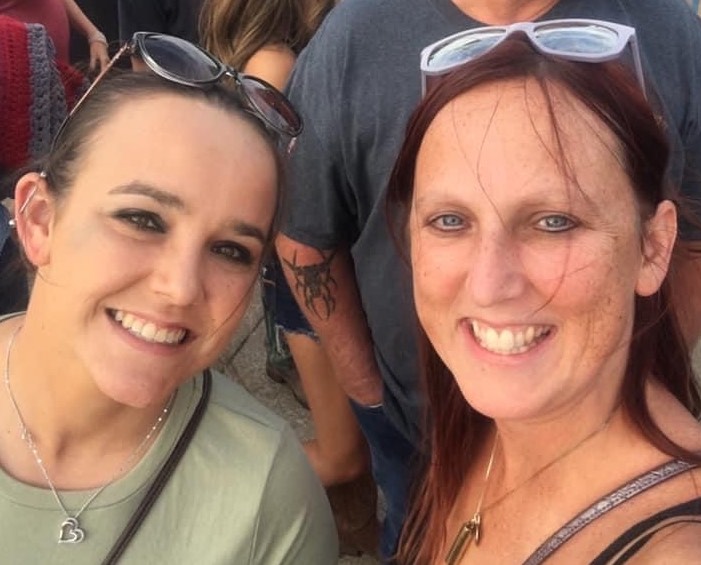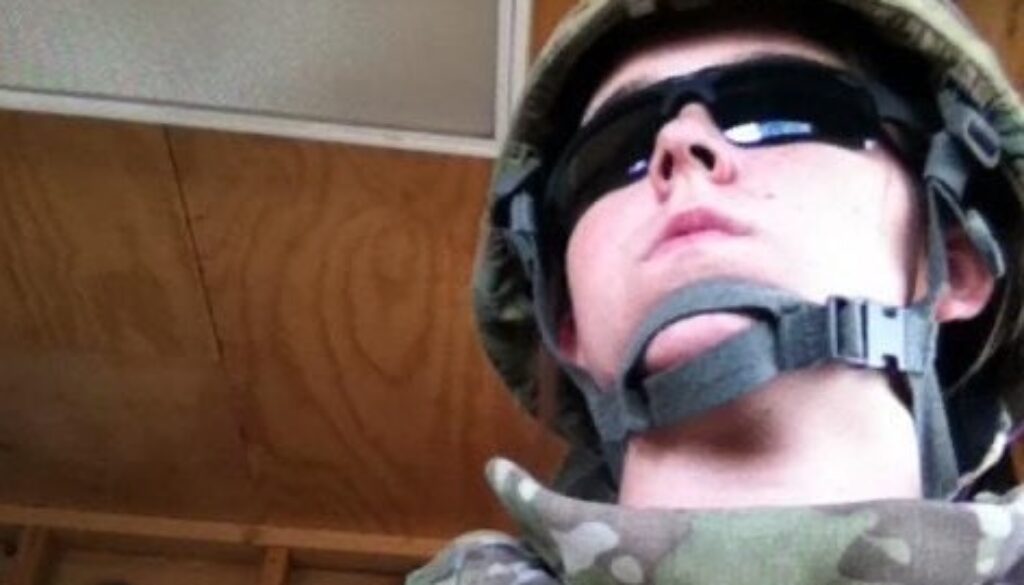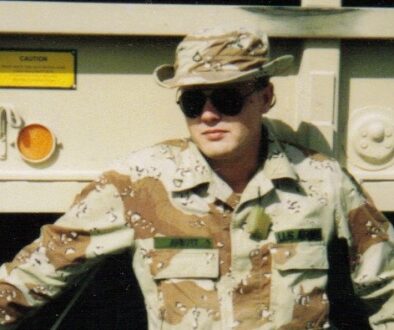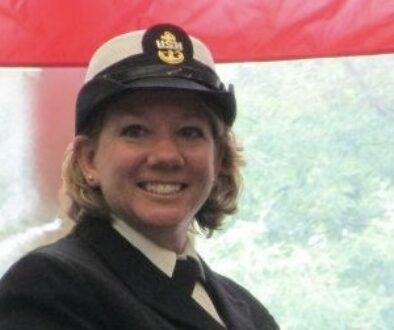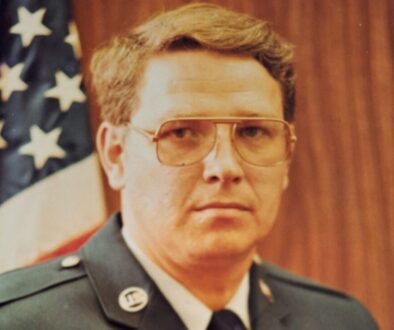Specialist Andrea Marshall, U.S. Army – Something Bigger Than Self
It takes courage to enlist in the military. Once you raise your right hand and take the oath to serve and defend the Constitution, you must go wherever the military says you are needed most. When the nation is at war, that need could very well be in a war zone where your life is at risk. Such is the case with Specialist Andrea Marshall, who enlisted in the Army in 2008. Four years later, she found herself assigned as a combat medic at a Forward Operating Base in Afghanistan. This is Andrea’s story.
Andrea was born and raised in New Berlin, Illinois, a very small town located about fifteen miles west of Springfield, the capital of Illinois. Her dad was a career Navy Reservist. Andrea remembers seeing him bring home books to study for advancement exams and carefully keeping track of his drill points to make sure he earned enough points to retire. His experience weighed heavily on her as she looked at life beyond New Berlin High School. She saw the military not only as an opportunity to get away from her small town and see the world, but also as a means of adding structure and direction to her “wishy-washy” outlook and participating in something that was bigger than self.
The Air Force almost snagged Andrea after she graduated from high school in 2007. In fact, an Air Force recruiter worked up an enlistment package on her before she graduated, but Andrea didn’t feel like he was being responsive to her questions and concerns. His indifference convinced Andrea the Air Force was not for her. Instead, she enrolled at Lincoln Land Community College hoping to teach music to kids. Music had been her love in high school, where she played the clarinet, the saxophone, and a handful of other instruments. One of the benefits of the Lincoln Land program was that it allowed her to teach music to kids at a local elementary school. That experience proved crucial, because it taught her that her love of teaching music to kids did not include dealing with their parents.
During the spring semester of 2008, Andrea talked to an Army recruiter at the college. Her goal was to be a musician in the Army’s Big Band. The recruiter said he could arrange for an audition, but she had to have a “Plan B” in case she wasn’t selected for the band. Andrea thought that was reasonable, so she and the recruiter worked up an alternative enlistment package for the medical field. She also took and passed the Army’s Physical Fitness Test (PT test), which she was told would benefit her once she graduated from Basic Training.
The Army recruiter delivered on his promise for the audition, which took place before the end of Andrea’s second semester at Lincoln Land Community College. She was very nervous for the audition and, looking back, she feels as though she should have auditioned for saxophone rather than clarinet. Unfortunately, she did not make the band, but she was still excited about her second choice of becoming an Army combat medic.
Andrea completed her second semester at Lincoln Land Community College and then reported to the St. Louis Military Entrance Processing Station (MEPS) for her formal induction into the Army in June 2008. She arrived at the MEPS around 4:00 a.m. and was the first person through the screening line. As instructed, she took an elevator to the building’s top floor. When the elevator arrived at the top floor, the doors wouldn’t open and Andrea found herself trapped inside alone. She pushed the help buttons, but it was just after four o’clock in the morning, so no one answered. Eventually she connected with someone through the elevator’s emergency phone who promised to send someone to get her out.
While Andrea was waiting for help to arrive, she called her father on her cell phone. He told her not to panic and asked if there was a vent in the elevator. When she told him there was, he assured her she would be okay because there should be enough oxygen in the elevator for her to breathe. This created a new worry because now Andrea wondered if her dad might be wrong. Finally, the firefighters arrived. They had to pry open the doors because the elevator had gone two feet past the stopping point for the top floor. Andrea climbed out, put the incident behind her, and went on with her day. Still, this was not the beginning she envisioned for her enlistment in the Army.
After completing her final physical and taking the oath of enlistment, Andrea and the other new Army recruits at the MEPS took a bus to the airport and a flight to Atlanta. Once in Atlanta, they boarded another bus to Fort Jackson, South Carolina, arriving at “zero dark thirty”. Drill sergeants screamed at them to get off their bus and immediately let the new arrivals know who was in charge.
Although the male and female recruits lived in separate barracks, they did their Basic Training together. Platoon and squad leaders were chosen by the drill sergeant from within the ranks of the recruits, rotating on a weekly basis. During one week, a recruit platoon leader returned to the barracks after the firing range upset because she was told she could no longer be a platoon leader because her rifle scores were too low. In consoling her comrade, Andrea indicated that didn’t seem right and that leadership was more than just being able to fire a weapon. Much to Andrea’s chagrin, the drill sergeant overheard what she said. The drill sergeant asked her, “So you don’t think I make good decisions?” He then promoted Andrea to platoon leader so she could see what leadership really entailed.
Unlike her predecessor, Andrea could shoot. In fact, when she went to the range to qualify with the M4 rifle, she is pretty sure the sergeants took bets on how well she would do. When Andrea’s target was scored, she only missed on two of the forty rounds she fired. Her drill sergeant came up to her afterwards and asked her how she could have missed twice, once on a 50-meter target and once on a 300-meter target. Andrea is sure he bet that she would score hits with all forty rounds and had to pay up even though she’d excelled on the range and earned her Sharpshooter badge.
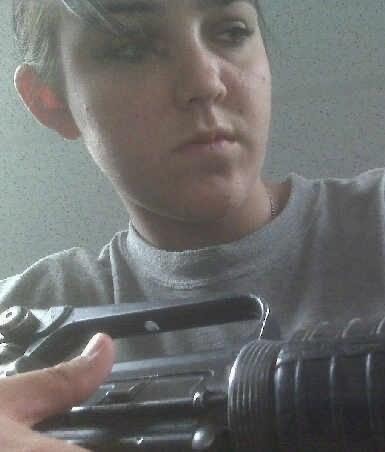
Andrea graduated from Basic Training in August 2008. Because she had completed one year of college and passed the PT test prior to enlisting, she was immediately promoted to Private First Class. This meant more pay and seniority as she reported to her follow-on Advanced Individual Training (AIT) at Fort Sam Houston, located in San Antonio, Texas. It was there that Andrea would learn to become a combat medic.
Andrea loved everything about AIT. The training was broken into two sessions. The first was the “civilian” session, where Andrea earned her Emergency Medical Technician (EMT) certification. The training was intense because the normal semester-long certification had to be completed within two months. During this session, Andrea learned such skills as controlling bleeding, stabilizing broken bones, and dealing with patients in shock.
The second two-month session was called the “whiskey school” because the Military Occupational Specialty (MOS) code for combat medics is 68W (where the “W” is pronounced “whiskey”). During this session, Andrea learned the additional skills she would need to keep wounded soldiers alive on the battlefield, like dealing with gunshot and shrapnel wounds, applying tourniquets and stabilizing soldiers suffering amputation injuries, and administering medications. As a final exercise, Andrea spent seven days in the field being tested on what she had learned on soldiers with simulated combat injuries.
Andrea graduated from AIT in December 2008, earning her combat medic MOS. After taking leave over the holidays, she reported to the 2nd Battalion, 159th Aviation Regiment (2-159th), located at Storck Barracks in Illesheim, Germany. The 2-159th Battalion, together with the 3rd Battalion, 159th Aviation Regiment (3-159th), operated Apache attack helicopters and were the two principal units operating from a small airfield located on the installation. The remainder of the 12th Combat Aviation Brigade, of which the 2-159th and 3-159th were a part, operated out of the U.S. Army Garrison at Ansbach, located about fifteen miles away. Thus the U.S. facilities available at Storck Barracks were limited to a commissary, a gas station, a small convenience store, an elementary school, and family housing.
On the bus taking her from the airport to Storck Barracks for the first time, Andrea couldn’t believe her new assignment. She’d enlisted in the Army to get away from small-town life in New Berlin, Illinois, and now she was going to live and work in a small town located in the middle of nowhere in Germany. Once she completed a week-long course about living in Germany and learned some basic German phrases, she felt less stressed about her new assignment.
Andrea worked at the Storck Barracks clinic, together with one or two other combat medics and a flight surgeon (sometimes two). Her duties included diagnosing and treating patients, issuing medications, and dealing with the normal administrative tasks associated with operating a clinic. For field exercises, Andrea would pack up the unit’s medical equipment, load it on a Humvee, drive the Humvee about ninety-five miles on the autobahn to the exercise site at the Grafenwoehr Training Area, and set up and run an aid station in the field.
During one such exercise, a soldier reported to the aid station that he was having terrible pain in his arm, having injured it while playing frisbee. Andrea examined his arm and concluded it was broken, which meant she would have to ride with him to the Grafenwoehr clinic, located about fifteen minutes away, where his arm could be x-rayed. When Andrea relayed her opinion to the flight surgeon to get his permission to go, he said he didn’t think it was broken and that Andrea was just saying that because she wanted to stop at Burger King, which was near the clinic. Andrea pushed back and the flight surgeon gave in. The trio then rode to the clinic where an x-ray revealed that the soldier’s arm was indeed broken. Feeling vindicated, Andrea insisted they stop at Burger King on the way back to the aid station and that the flight surgeon pay for it, which he did.
In 2011, Andrea had a baby girl and got married to another soldier assigned to the unit. She had only a little time with her daughter, though, before another big event loomed on the horizon – the 2-159th Battalion was getting ready to deploy to Afghanistan in May 2012. Because Andrea and her husband were both deploying with the unit, they flew back to the United States to meet each other’s parents and leave Andrea’s daughter in their shared custody while Andrea and her husband deployed. Having to leave her daughter was very hard, but at least Andrea knew she was in good hands.
Andrea and the 2-159th Battalion did not deploy directly to Afghanistan – they made an initial stop in Kazakhstan for some final theater-specific training. This included rollover training, where Andrea learned how to escape from a Humvee after it rolled over and pull the other occupants to safety. After about a week in Kazakhstan, the unit continued to Forward Operating Base (FOB) Sharana in eastern Afghanistan, near the border with Pakistan.
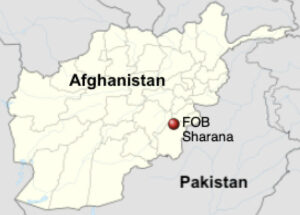
Andrea arrived at FOB Sharana in May 2012. Aside from Afghanistan being a dangerous war zone, Andrea thought the country itself was beautiful. She also had the opportunity to meet some of the local nationals who had set up tents where soldiers could purchase knives, DVDs, and rugs. She found the people she met very friendly and easy to talk to.
Life at FOB Sharana soon settled into a routine with the highlight of every day revolving around meals. Soldiers would do their work wherever they were assigned, but for meals, they would go to the chow hall as a group with their friends. Andrea found it strangely similar to the way the various cliques ate together in her high school cafeteria.
Another important event was when supplies were flown in. If the supplies included Pepsi, some of the supply guys unloading the helicopters would bring a case to the clinic because they knew the Andrea liked it. In return, Andrea would put on a Scrubs, House, or Chief DVD and let the supply guys watch on the TV in the waiting room.
During Andrea’s time at FOB Sharana, she typically dealt with lots of routine injuries, like ankle sprains occurring when soldiers twisted their ankles running on the FOB’s rock-strewn terrain. On one occasion, a soldier tried to use his knife to clean something stuck to a helicopter and ended up stabbing himself in the leg. On another occasion, a soldier passed out while standing in formation and fell face first onto the rock and gravel-covered ground. In both cases, Andrea cleaned the wounds and stitched them up and the soldiers returned to duty.
The most serious condition Andrea had to deal with turned out to be her own. In August 2012, Andrea began to experience severe pain in her lower back. Eventually, the pain got so bad that she collapsed while trying to get her gear. The soldiers from the communications shop (S-6) heard her fall and called the flight surgeon. The flight surgeon initially suspected kidney stones, but later determined the cause to be blood clots resulting from a known risk of smoking while taking birth control pills. Although Andrea was aware of the risk, she never thought it would happen to her. Now she cautions women about the risk saying it’s more than just theoretical—it really can happen.
The condition was so severe that Andrea had to be medevac’d to Landstuhl Regional Medical Center at Ramstein Air Base in Germany. She was initially placed in the Intensive Care Unit (ICU) until the blood clots resolved. During this time, the Wounded Warrior Project stepped in to purchase clothes for her at the PX (post exchange) and made sure she was taken care of. Andrea then transitioned to temporary quarters at Ramstein so she could be monitored as she moved off blood thinner shots and started blood thinner pills.
After approximately three weeks, Andrea was back on her feet, but she was not permitted to return to her unit in Afghanistan because of her blood thinner medication. Accordingly, she returned to Storck Barracks, where she rejoined her husband who was recuperating from surgery after severing a tendon in his thumb. When Andrea became pregnant with their second child, she told her husband she couldn’t do another hitch in the Army. She’d already missed her daughter’s first birthday, her first steps, and her first words, and now the cycle was going to start again.
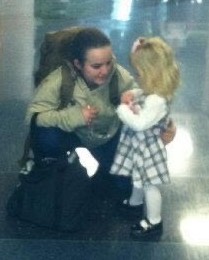
With her new direction clear, Andrea was honorably discharged from the Army in February 2013. Because her husband had to finish his tour in Germany and Andrea was not considered a command sponsored dependent, Andrea moved with her daughter to Alabama to live with her in-laws. The family later reunited at Fort Campbell, Kentucky, for Andrea’s husband’s follow-on tour, but the pressures on the family proved too great and Andrea’s marriage dissolved. Andrea then moved with her daughter and son back to her hometown in New Berlin, Illinois, to start her life anew.
As Andrea looks back at her service in the Army, there is one painful aspect that needs to be told. Andrea was sexually assaulted by a someone she trusted. Because he was in her chain of command, she felt like she had nowhere to turn and no one she could talk to about it. She hopes that by talking about it now, it will empower women to reach out to each other for strength and support. She also calls on the military to continue to root out sexual misconduct by changing the culture and holding those responsible accountable for their actions.
After arriving back in Illinois, Andrea returned to college to pursue a nursing degree using her GI-Bill benefits. However, when she learned the program would not give her credit for her previous science courses and some family emergencies required her time, she decided she needed a stable career now to provide for the two most important people in her life: her daughter, Nevaeh, and her son, Aidan. That’s when she found a position working as a National Cemetery Representative for the Camp Butler National Cemetery in Springfield, Illinois. In her position, Andrea helps veterans and their families at a time when they need it most, meeting with the family members of the deceased, advising them of veterans’ benefits, and providing them information on burials at national cemeteries.
Voices to Veterans is proud to salute Specialist Andrea Marshall for her service in Army. She enlisted during a time of war and answered our countries call by deploying to Afghanistan, where she served with distinction. She then returned to civilian life to raise her family, all while continuing to serve veterans and their families as a National Cemetery Representative. We thank Andrea and her family for their service and sacrifice, and wish her fair winds and following seas.
If you enjoyed Andrea’s story, please sign up for the Voices to Veterans Spotlight monthly newsletter by clicking here. Once each month, you’ll receive a new written veteran’s story and a new podcast directly in your mailbox. Best of all, it’s free and you can unsubscribe at any time.
